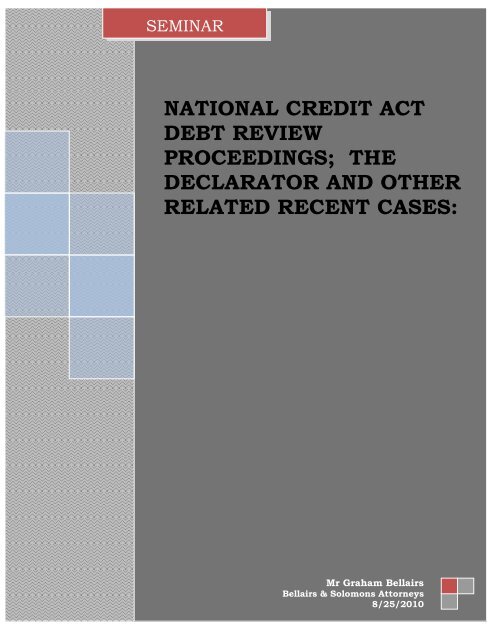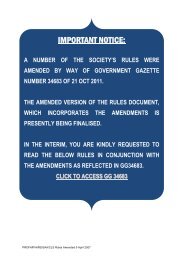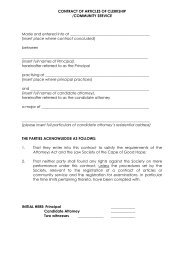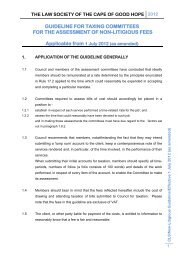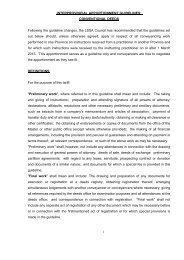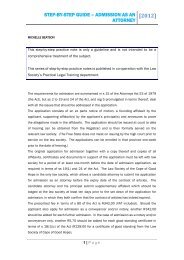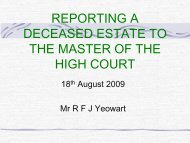national credit act debt review proceedings; the ... - Cape Law Society
national credit act debt review proceedings; the ... - Cape Law Society
national credit act debt review proceedings; the ... - Cape Law Society
- No tags were found...
You also want an ePaper? Increase the reach of your titles
YUMPU automatically turns print PDFs into web optimized ePapers that Google loves.
SEMINARNATIONAL CREDIT ACTDEBT REVIEWPROCEEDINGS; THEDECLARATOR AND OTHERRELATED RECENT CASES:Mr Graham BellairsBellairs & Solomons Attorneys8/25/2010
P a g e | 1The National Credit Act (hereinafter referred to as <strong>the</strong> “NCA”) has had a vast and radicaleffect on consumer law. It has replaced <strong>the</strong> Credit Agreement Act and Usury Act andintroduced a new procedure for enabling financially hard pressed consumers to obtainrelief from over in<strong>debt</strong>edness. Legal pr<strong>act</strong>itioners particularly those who pr<strong>act</strong>ise in <strong>the</strong>Magistrate’s Courts have had to become acquainted with <strong>the</strong> new legislation andprocedures for enforcing of <strong>credit</strong> agreements and <strong>debt</strong> recovery by applying <strong>the</strong> Actand <strong>the</strong> case law which has developed since <strong>the</strong> promulgation of <strong>the</strong> Act. The processhas been made more difficult by virtue of <strong>the</strong> f<strong>act</strong> that <strong>the</strong> NCA is a product of <strong>the</strong>Department of Trade and Industry and is not written in <strong>the</strong> legal jargon which is utilisedby attorneys and in Court <strong>proceedings</strong>. Indeed, it has been <strong>the</strong> subject of criticism by<strong>the</strong> Courts and in f<strong>act</strong> it necessitated <strong>the</strong> National Credit Regulator to apply to Court fora declaratory order to interpret certain sections of <strong>the</strong> Act to establish clarity andcertainty.The NCA is poorly drafted and complicated by <strong>the</strong> f<strong>act</strong> that a pr<strong>act</strong>itioner has to flip fromsection to section and chapter to chapter in order to find out whe<strong>the</strong>r <strong>the</strong> Act applies to aparticular agreement, to what extent it might do so and if so, what procedures are to befollowed in instituting litigation. It is also very wide and far ranging extending to some173 sections which are divided up into 9 chapters. This seminar could never do justiceto <strong>the</strong> entire ambit of <strong>the</strong> Act and its interpretation, but ra<strong>the</strong>r it is intended to focus on<strong>debt</strong> <strong>review</strong> <strong>proceedings</strong> and one or two ancillary matters such as Section 129 noticesand which agreements fall within <strong>the</strong> ambit of <strong>the</strong> Act.I will commence <strong>the</strong> seminar by highlighting certain recent decisions relating to whe<strong>the</strong>r<strong>the</strong> Act applies to certain agreements and to <strong>the</strong> notice to be given in terms of Section129 (1) of <strong>the</strong> Act. Thereafter as an introduction to Yusria Cornelius’ presentation a briefresume of <strong>the</strong> declarator decision handed down by du Plessis J in <strong>the</strong> North GautengHigh Court in Pretoria in <strong>the</strong> matter between <strong>the</strong> National Credit Regulator, <strong>the</strong> fourmajor banks and o<strong>the</strong>r players in <strong>the</strong> <strong>credit</strong> industry. It is more formally known as <strong>the</strong>National Credit Regulator vs Nedbank and o<strong>the</strong>rs 2009 (6) SA 295 GNP. YusriaCornelius will be dealing with <strong>the</strong> more pr<strong>act</strong>ical aspects of drafting and moving <strong>debt</strong><strong>review</strong> applications.I have already alluded to <strong>the</strong> confusion which has resulted as a consequence of <strong>the</strong>introduction by <strong>the</strong> NCA of various concepts, one of which is <strong>the</strong> concept of an incidental<strong>credit</strong> agreement or trans<strong>act</strong>ion. It is not my purpose to delve into what is or what is notan incidental <strong>credit</strong> agreement, but on this subject I can refer you to an informativearticle in De Rebus entitled “Attorney accounts and <strong>the</strong> nature of an incidental <strong>credit</strong>” bySusan de Kock in <strong>the</strong> April 2010 edition of De Rebus at pages 26 to 28.There was for a while a view taken by attorneys that levies payable to Bodies Corporateunder Section 37 of <strong>the</strong> Sectional Titles Act constituted claims under incidental <strong>credit</strong>agreements as defined in Section 1 of <strong>the</strong> Act for <strong>the</strong> reason that interest or evenpenalties are chargeable by Bodies Corporate in <strong>the</strong> event of late payment of suchlevies.
P a g e | 2The matter was decided recently in <strong>the</strong> unreported case of TS Dlamini vs BodyCorporate of Frenoleen Case Number AR 611/09 in which <strong>the</strong> Court had regard to <strong>the</strong>definition in Section 1 of <strong>the</strong> NCA of an incidental <strong>credit</strong> agreement as “an agreement interms of which an account was tendered for goods or services that have been providedto <strong>the</strong> consumer or goods or services that are to be provided to a consumer over aperiod of time and ei<strong>the</strong>r or both of <strong>the</strong> following conditions apply (a) a fee, charge orinterest became payable when payment of an amount charged in terms of that accountwas not made on or before a determined period or date; or (b) two prices were quotedfor settlement of <strong>the</strong> account, <strong>the</strong> lowest price being applicable if <strong>the</strong> account is paid onor before a determined date and <strong>the</strong> high price being applicable due to <strong>the</strong> account nothaving been paid by that date”. The Court in considering <strong>the</strong> matter found that leviescharged by a Body Corporate to its members are not so charged in terms of anincidental <strong>credit</strong> agreement because <strong>the</strong> levies do not constitute an account tendered forgoods or services provided by <strong>the</strong> Body Corporate to <strong>the</strong> consumer. Levies are notpayable by members of <strong>the</strong> Body Corporate in terms of an agreement as defined in <strong>the</strong>Act, but are payable by virtue of <strong>the</strong> provisions of <strong>the</strong> Sectional Titles Act No. 95 of1986.There is an article in <strong>the</strong> May 2010 De Rebus at page 61 by Lisa Mills on this decision.She is an attorney who appeared in this matter and persuaded <strong>the</strong> Court to grantjudgment for <strong>the</strong> above reasons.The question has arisen as to whe<strong>the</strong>r an acknowledgement of <strong>debt</strong> is a <strong>credit</strong>agreement covered by <strong>the</strong> NCA. In <strong>the</strong> decision of Carter Trading (Pty) Ltd vs Blignaut2010 (2) SA 46 ECP an acknowledgment of <strong>debt</strong> concluded between <strong>the</strong> Plaintiff and<strong>the</strong> Defendant prior to <strong>the</strong> issue of summons and in terms of which <strong>the</strong> Defendantacknowledged liability to <strong>the</strong> Plaintiff for <strong>the</strong> purchase price of certain goods sold anddelivered and undertook to pay same toge<strong>the</strong>r with interest on <strong>the</strong> purchase priceaccruing from time to time by way of instalments was held to fit <strong>the</strong> definition of a <strong>credit</strong>agreement envisaged by Section 8 (4) (f) of <strong>the</strong> NCA which provides that “an agreementconstitutes a <strong>credit</strong> trans<strong>act</strong>ion if it is any o<strong>the</strong>r agreement o<strong>the</strong>r than an <strong>credit</strong> facility ora <strong>credit</strong> guarantee in terms of which payment of an amount owed by one person toano<strong>the</strong>r is deferred, and any charge, fee or interest is payable to <strong>the</strong> <strong>credit</strong> provider inrespect of <strong>the</strong> agreement or <strong>the</strong> amount that has been deferred”. The Court also foundthat <strong>the</strong> acknowledgment of <strong>debt</strong> had been based on a <strong>credit</strong> sale of goods and that itdid not novate that original agreement.As a consequence <strong>the</strong> Court suspended <strong>the</strong> <strong>proceedings</strong> as <strong>the</strong> Plaintiff had not given<strong>the</strong> Defendant a notice in terms of Section 129 (1) of <strong>the</strong> NCA and, fortunately for <strong>the</strong>Plaintiff, <strong>the</strong> Court invoked <strong>the</strong> provisions of Section 130 (4) of <strong>the</strong> NCA as aconsequence of which <strong>the</strong> <strong>proceedings</strong> were simply suspended ra<strong>the</strong>r than being setaside.This decision begs <strong>the</strong> question as to whe<strong>the</strong>r an acknowledgment of <strong>debt</strong> signed by ajudgment <strong>debt</strong>or after judgment has been given against him for an amount will <strong>the</strong>nconstitute an agreement in terms of Section 8 (4) (f) as it certainly is an agreement in
P a g e | 3terms of which payment of an amount owed by one person to ano<strong>the</strong>r is deferred and acharge, fee or interest is payable in respect of <strong>the</strong> agreement for <strong>the</strong> amount that hasbeen deferred. I think it would fall within that definition and <strong>the</strong>refore pr<strong>act</strong>itionersshould be aware of this. Jenny Rossouw, an attorney, has written an article on <strong>the</strong>Carter Trading case in <strong>the</strong> August 2010 edition of De Rebus at page 45.The confusion referred to above created by <strong>the</strong> NCA is exemplified in respect of <strong>the</strong>giving of notice in terms of Section 129 (1) of <strong>the</strong> NCA. We all know that before <strong>the</strong>institution of legal <strong>proceedings</strong> against a consumer in default under a <strong>credit</strong> agreement itis necessary for <strong>the</strong> <strong>credit</strong> provider to “draw <strong>the</strong> default to <strong>the</strong> notice of <strong>the</strong> consumer inwriting and propose that <strong>the</strong> consumer refer <strong>the</strong> <strong>credit</strong> agreement to a <strong>debt</strong> counsellor,alternative dispute resolution agent, consumer court or ombud with jurisdiction with <strong>the</strong>intent that <strong>the</strong> parties resolve any dispute under <strong>the</strong> agreement or develop and agree ona plan to bring <strong>the</strong> payments under <strong>the</strong> agreement up to date”. Although <strong>the</strong> beginningof that section is preceded with <strong>the</strong> word “may”, sections 129 (b) and 130 (1) preclude<strong>the</strong> <strong>credit</strong> provider from instituting legal <strong>proceedings</strong> until such time as a period of 10(ten) business days have elapsed since <strong>the</strong> <strong>credit</strong> provider has delivered <strong>the</strong> notice.However, nei<strong>the</strong>r of those two sections say how such notice is to be delivered. One isforced to traverse <strong>the</strong> Act from Section 65 to 168 and <strong>the</strong>n back to Section 96 of <strong>the</strong>NCA. Section 65 is to be found in chapter 4 of <strong>the</strong> Act dealing with consumer <strong>credit</strong>policy and provides that every document that is required to be delivered to a consumerin terms of <strong>the</strong> Act must be delivered in <strong>the</strong> prescribed manner and if no method hasbeen prescribed for <strong>the</strong> delivery of a particular document <strong>the</strong> person required to deliverthat document must make it available through one or more of a list of mechanismsincluding in person at <strong>the</strong> business premises of <strong>the</strong> <strong>credit</strong> provider or by ordinary mail,by fax, by e-mail, principle webpage or delivery in a manner chosen by <strong>the</strong> consumerfrom <strong>the</strong> options referred to above. This section prima facie appears to be in conflictwith <strong>the</strong> provisions of Section 168 of <strong>the</strong> Act which finds itself in part C of chapter 8 andwhich deals with <strong>the</strong> enforcement of <strong>the</strong> Act. This section provides that “unlesso<strong>the</strong>rwise provided in this Act a notice order or o<strong>the</strong>r document that must be served on aperson will have been properly served when it is has been ei<strong>the</strong>r (a) delivered to thatperson or (b) sent by registered mail to <strong>the</strong> person’s last known address.It would <strong>the</strong>refore appear that <strong>the</strong> delivery of <strong>the</strong> Section 129 notice would morecorrectly be governed by <strong>the</strong> provisions of Section 168 of <strong>the</strong> NCA save for <strong>the</strong> f<strong>act</strong> that<strong>the</strong> introduction to that provision is governed by <strong>the</strong> phrase “unless o<strong>the</strong>rwise provided”.This phrase refers one to <strong>the</strong> provisions of yet ano<strong>the</strong>r section namely, that of Section96 of <strong>the</strong> NCA which bears <strong>the</strong> heading: “address for notice”. Section 96 is to be foundin part B of chapter 5 of <strong>the</strong> Act which deals with consumer <strong>credit</strong> agreements. Section96 provides that whenever a party to a <strong>credit</strong> agreement is required or wishes to givelegal notice to <strong>the</strong> o<strong>the</strong>r party for any purpose contemplated in <strong>the</strong> agreement this Act orany o<strong>the</strong>r law <strong>the</strong> party giving notice must deliver that notice to <strong>the</strong> o<strong>the</strong>r party at (a) <strong>the</strong>address of that party as set out in <strong>the</strong> agreement unless paragraph (b) applies; or (b) <strong>the</strong>address most recently provided by <strong>the</strong> recipient in accordance with sub-section (2).Sub-section (2) in turn provides that a party to a <strong>credit</strong> agreement may change <strong>the</strong>ir (sic)
P a g e | 4address by delivering to <strong>the</strong> o<strong>the</strong>r party a written notice of <strong>the</strong> new address by hand,registered mail or electronic mail if that o<strong>the</strong>r party has provided an e-mail address.I pause to note that if a <strong>credit</strong> provider is aware that a consumer who originally recordedan address for notice in an agreement and is no longer at that address ei<strong>the</strong>r because<strong>the</strong> consumer has informed him of his change of address telephonically or he has beentraced to ano<strong>the</strong>r address, in order to comply with <strong>the</strong> provisions of Section 96 <strong>the</strong> noticein terms of Section 129 (1) of <strong>the</strong> NCA must still be given to <strong>the</strong> address recorded in <strong>the</strong>agreement and not to that new address. This appears to be absurd, but never<strong>the</strong>less itis <strong>the</strong> applicable law.The question of delivery of <strong>the</strong> notice has been <strong>the</strong> subject of much litigation in recenttimes and judicial authority is divided as to whe<strong>the</strong>r <strong>the</strong> delivery requirement compels<strong>the</strong> <strong>credit</strong> provider to ensure that physical delivery of <strong>the</strong> notice is effected upon <strong>the</strong>consumer or whe<strong>the</strong>r simply dispatching <strong>the</strong> notice by registered post to <strong>the</strong> addressreferred to in Section 96 of <strong>the</strong> NCA is sufficient. The former cases which require that<strong>the</strong> notice be received by <strong>the</strong> consumer are Absa Bank Ltd vs Prachaska t/a BiancaCarter Interiors 2009 (2) SA 512 D (Naidu, AJ) and Firstrand Bank Ltd vs Dlamini(unreported GNP Case number 50146/09) (Murphy, J). Cases deciding that delivery iseffected simply by dispatching <strong>the</strong> notice by registered post are Munien vs BMWFinancial Services SA (Pty) Ltd and ano<strong>the</strong>r 2010 (1) SA 549 KZD (Wallace, J) followedin <strong>the</strong> cases of Rossouw, Mellot and Rockhill and <strong>the</strong>n followed in <strong>the</strong> most recent caseon <strong>the</strong> subject namely that of Starita vs Absa Bank Ltd 2010 (3) SA 443 GSJ (AndreGautschi, AJ).Time does not allow for me to analyse each of <strong>the</strong>se cases in depth, but I would submitthat <strong>the</strong> decision of Gautschi in <strong>the</strong> Starita case is <strong>the</strong> one which should be followed.After an in depth consideration of all of <strong>the</strong> aforementioned cases and in particular <strong>the</strong>view of Murphy, J Gautschi confirms that simply dispatching a notice by registered postis sufficient and that it need not <strong>act</strong>ually be received by <strong>the</strong> consumer. For fur<strong>the</strong>rreading <strong>the</strong>re is an article in <strong>the</strong> July 2010 De Rebus by Simone Monty on Murphy’sdecision at page 41 and <strong>the</strong> Gautschi judgment is referred to in <strong>the</strong> law report section of<strong>the</strong> August 2010 De Rebus at page 27.Out of frustration and uncertainty as to whe<strong>the</strong>r or not <strong>the</strong> provisions of <strong>the</strong> NCA apply toa <strong>credit</strong> agreement or, if it does, in order to avoid <strong>the</strong>se provisions, a pr<strong>act</strong>itioner may becompelled to advise his client in <strong>the</strong> appropriate circumstances to apply for <strong>the</strong>sequestration of <strong>the</strong> consumer. Please note that by applying for an order forsequestration of a consumer based on a <strong>debt</strong> arising from a <strong>credit</strong> agreement a <strong>credit</strong>provider would not be seeking enforcement of a <strong>debt</strong> in which event <strong>the</strong> provisions of <strong>the</strong>NCA would apply, but ra<strong>the</strong>r to bring about <strong>the</strong> convergence of <strong>credit</strong>ors to ensure that<strong>the</strong> consumer’s estate is wound up in an orderly fashion. Therefore compliance withSection 129 of <strong>the</strong> NCA is not a necessary prerequisite for a sequestration application.This view was held in <strong>the</strong> case of Investec Bank Limited vs Mutemeri and ano<strong>the</strong>r 2010(1) SA 265 GSJ (Sachwell, J).
P a g e | 5The Munien case referred to above and followed by Gautschi held that <strong>the</strong> Section 129(1) notice need not be received by <strong>the</strong> consumer and that <strong>the</strong> <strong>credit</strong> provider dischargedits obligations by sending it to <strong>the</strong> postal address selected by <strong>the</strong> consumer. So long asit was delivered in <strong>the</strong> manner chosen by <strong>the</strong> consumer in such manner as one specifiedin Section 65 (2) (a) of <strong>the</strong> Act it was irrelevant whe<strong>the</strong>r <strong>the</strong> notice came to <strong>the</strong> attentionof <strong>the</strong> consumer. Wallis, J expressed <strong>the</strong> view that if <strong>the</strong> letter was delivered byregistered post instead of ordinary mail this did not constitute a material departure from<strong>the</strong> provisions of <strong>the</strong> section and <strong>the</strong> f<strong>act</strong> that a letter is registered makes it more notless likely to reach its destination. This decision was followed in an unreported casemore recent than <strong>the</strong> Starita judgment. It is Standard Bank of South Africa Limited vs DS Maharaj t/a Sanraw Transport Case number 2216/10 (Swain, J).Gautschi criticises <strong>the</strong> NCA as being a badly drafted <strong>act</strong> and refers to not only <strong>the</strong>absurdity of a strict interpretation of <strong>the</strong> Act of giving notice in terms of Section 129 (1) of<strong>the</strong> Act as being <strong>the</strong> institution of legal <strong>proceedings</strong> which would of its own right precludea consumer from taking steps to apply for <strong>debt</strong> <strong>review</strong> in terms of Section 86 (2) of <strong>the</strong>Act, but he also refers to <strong>the</strong> liberal use of numerous expressions used in <strong>the</strong> Act withregard to giving notice and delivery which he describes as being used “indiscriminatelyand without precision”. (See page 452 (F) to (H).These interpretational difficulties in f<strong>act</strong> prompted <strong>the</strong> National Credit Regulatorestablished under Section 12 of <strong>the</strong> NCA to seek a number of declaratory orders aimedat clarifying interpretational difficulties that those who work with <strong>the</strong> Act experience inpr<strong>act</strong>ice. There were 15 applications for declarators considered and 14 orders weregranted in <strong>the</strong> judgment.In order to set <strong>the</strong> context of <strong>the</strong> issues raised in <strong>the</strong> declarator Du Plessis, Jcommences with an overview of Sections 83 to 87 of <strong>the</strong> NCA which I can summarise asfollows:1. A <strong>debt</strong> counsellor to whom application for <strong>debt</strong> <strong>review</strong> is made can re<strong>act</strong> in threedifferent ways. (see Section 86 (7))2. If he reasonably concludes that <strong>the</strong> consumer is not over in<strong>debt</strong>ed he must reject<strong>the</strong> application to be declared over in<strong>debt</strong>ed. In such event <strong>the</strong> consumer mayapply directly to <strong>the</strong> Magistrate’s Court for an Order to <strong>the</strong> effect that one or moreof his <strong>credit</strong> agreements are reckless and or an Order that his obligations be rearranged.(see Section 86 (7) (a) and Section 86 (a))3. The <strong>debt</strong> counsellor may find that <strong>the</strong> consumer is not over in<strong>debt</strong>ed, but that he orshe is never<strong>the</strong>less experiencing or likely to experience difficulty in satisfyingtimeously all of his or her obligations under <strong>credit</strong> agreements and in such event a<strong>debt</strong> counsellor may recommend that <strong>the</strong> consumer and respective <strong>credit</strong> providersvoluntarily consider and agree on a plan of <strong>debt</strong> re-arrangement. This is referredto as a voluntary re-arrangement. (see Section 86 (7) (b))
P a g e | 64. The <strong>debt</strong> counsellor could find that <strong>the</strong> consumer is over in<strong>debt</strong>ed in which even<strong>the</strong> “may issue a proposal recommending that <strong>the</strong> Magistrate’s Court make ei<strong>the</strong>r orboth of <strong>the</strong> following orders; namely, that one or more of <strong>the</strong> consumer <strong>credit</strong>agreements be declared to be reckless <strong>credit</strong> and/or that one or more of <strong>the</strong>consumer’s obligations be re-arranged in one of <strong>the</strong> number of specified ways (thisis referred to as a re-arrangement by <strong>the</strong> Court). (see Section 86 (7) (c))5. Reverting to <strong>the</strong> issue of a voluntary re-arrangement where consensus is reached<strong>the</strong> re-arrangement must be recorded in a consent order and recorded by <strong>the</strong> Courtin terms of Section 138 of <strong>the</strong> Act. If consensus cannot be reached <strong>the</strong>n <strong>the</strong> <strong>debt</strong>counsellor must refer <strong>the</strong> matter to <strong>the</strong> Magistrate’s Court with <strong>the</strong> recommendationfor voluntary re-arrangement. In such event in terms of Section 87 (1) (a) <strong>the</strong>Magistrate must conduct a hearing and may reject <strong>the</strong> recommendation or makean Order declaring any <strong>credit</strong> agreement to be reckless and may in addition makean Order re-arranging <strong>the</strong> consumer’s obligations in <strong>the</strong> manner contemplated inSection 86 (7) (c) (ii). There are four possible options set out in Section 86 (7) (c)(ii); extending <strong>the</strong> period of <strong>the</strong> agreement and reducing <strong>the</strong> amount of eachpayment; alternatively postponing during a specified period <strong>the</strong> dates on whichpayments are due; alternatively, a combination of <strong>the</strong> above, or re-calculating <strong>the</strong>consumer’s obligations because of contraventions of specified sections of <strong>the</strong>NCA.Against <strong>the</strong> background of this overview <strong>the</strong> Court decided <strong>the</strong> following issueswhich required clarification:(a)The first declaratory order sought was: On a proper interpretation of Section86 (b) (6), it applies to <strong>the</strong> circumstances contemplated in Section 86 (7) (c).To put it simply <strong>the</strong> declarator begs <strong>the</strong> question would <strong>the</strong> <strong>debt</strong> counsellormake a similar if not <strong>the</strong> same application in <strong>the</strong> case of a finding that <strong>the</strong><strong>debt</strong>or is in f<strong>act</strong> over in<strong>debt</strong>ed as it would in <strong>the</strong> case of a finding that <strong>the</strong><strong>debt</strong>or is not over in<strong>debt</strong>ed, but going to suffer difficulty and <strong>the</strong>re is novoluntary rearrangement. The answer in terms of <strong>the</strong> judgment wasultimately <strong>the</strong> affirmative. In essence <strong>the</strong> problem is created by <strong>the</strong> poor andvague wording of <strong>the</strong> section which relates to a finding of over in<strong>debt</strong>ednesswhich requires <strong>the</strong> <strong>debt</strong> counsellor in Section 86 (7) (c) “to issue a proposalfor <strong>the</strong> Magistrate’s Court to make an Order” whereas on <strong>the</strong> basis of hisfinding that <strong>the</strong> <strong>debt</strong>or is not over in<strong>debt</strong>ed, but experiencing difficulty andconsensus cannot be reached on a voluntary Order, <strong>the</strong>n “<strong>the</strong> <strong>debt</strong> counsellormust refer <strong>the</strong> matter to <strong>the</strong> Magistrate’s Court with <strong>the</strong> recommendation”.(see Section 86 (8) (b))In o<strong>the</strong>r words and to put it differently in terms of Section 86 (8) (b) a <strong>debt</strong>counsellor must refer his voluntary proposal to <strong>the</strong> Magistrate’s Court with arecommendation. Section 87 (1) empowers <strong>the</strong> Magistrate’s Court to whom<strong>the</strong> proposal in Section 86 (8) (b) is referred to conduct a hearing and afterinvestigation to make an Order.
P a g e | 7However, no provision is made in Section 87 or anywhere else in <strong>the</strong> Act for<strong>the</strong> referral to a Magistrate’s Court to conduct a hearing and make an Order inline with a proposal in terms of Section 87 (c) (i) and (ii) namely where aconsumer is found to be over in<strong>debt</strong>ed. Therefore and for this reason <strong>the</strong>Court implied that <strong>the</strong> procedures envisaged in Section 86 (8) (b) (as readwith Section 87 (1) which gives effect to Section 86 (b)) must be incorporatedin <strong>the</strong> provisions of Section 86 (7) (c) as well. In effect <strong>the</strong>n <strong>the</strong> same type ofapplication to Court should be made by <strong>the</strong> <strong>debt</strong> counsellor.(b)(c)The next declaratory order sought an answer to <strong>the</strong> question does aMagistrate fulfill an administrative as opposed to a judicial role? The Courtnoted that <strong>the</strong> provisions of Section 86 and 87 always refer to a Magistrate’sCourt and not to a Magistrate. The Court fur<strong>the</strong>r noted that <strong>the</strong> functions ofCourts are judicial and not administrative in nature. Debt <strong>review</strong> may becontentious and require in each step a judicial process including <strong>the</strong> hearingof evidence and applying <strong>the</strong> law to <strong>the</strong> f<strong>act</strong>s. Accordingly <strong>the</strong> Court declaredthat <strong>the</strong> Magistrate would fulfill a judicial and not an administrative role.A declarator was sought that in a case of a voluntary re-arrangement where<strong>the</strong>re is lack of consensus as envisaged by Section 86 (8) (b) of <strong>the</strong> Act aMagistrate’s Court to whom <strong>the</strong> matter is allocated is obliged to conduct ahearing and make an Order in terms of Section 87 (1) (a) or (b) namely ei<strong>the</strong>rreject <strong>the</strong> application or grant <strong>the</strong> Orders mentioned in Section 87 (1) (b).The Court held that <strong>the</strong> Magistrate’s Court being a creature of statute isbound to make a finding in terms of Section 87 and no o<strong>the</strong>r. That sectionalso refers to Section 83 which provides for <strong>the</strong> way a Magistrate should dealwith reckless <strong>credit</strong>. Section 87 also incorporates Section 86 (7) (c) (ii) whichsets out <strong>the</strong> way in which a Magistrate can rearrange <strong>the</strong> consumer’s <strong>debt</strong>.(d)(e)What procedure is to be followed when conducting a hearing in terms ofSection 87 of <strong>the</strong> NCA; is it <strong>the</strong> procedure in terms of Magistrate’s Court Actor a sui generis procedure? The answer given by <strong>the</strong> Court is that <strong>the</strong>Magistrate’s Court derives its powers from <strong>the</strong> Magistrate’s Court Act. It is acreature of statute. Court rules are promulgated to regulate <strong>the</strong> conduct of<strong>proceedings</strong> in <strong>the</strong> Court in question and <strong>the</strong>y describe <strong>the</strong> manner in whichmatters are brought to Court. On <strong>the</strong> o<strong>the</strong>r hand no o<strong>the</strong>r <strong>proceedings</strong> aredescribed in <strong>the</strong> NCA and <strong>the</strong>refore <strong>the</strong> Court held that <strong>the</strong> Magistrate’s CourtAct and its rules apply in determining <strong>the</strong> procedure; more specifically Rule55 of <strong>the</strong> Magistrate’s Court Act govern <strong>the</strong>se procedures.A declarator sought was an Order to <strong>the</strong> effect that a recommendation by a<strong>debt</strong> counsellor in terms of Section 86 (8) (b) does not constitute anapplication for <strong>the</strong> purpose of <strong>the</strong> Magistrate’s Court Act and <strong>the</strong> <strong>debt</strong>
P a g e | 8counsellor is not required to comply with <strong>the</strong> Magistrate’s Court Act or rules.For <strong>the</strong> reasons previously referred to, this declarator was refused and anOrder made that a referral by a <strong>debt</strong> counsellor to a Magistrate’s Court underSection 86 (8) (b) and Section 86 (7) (c) of <strong>the</strong> NCA is an application within<strong>the</strong> meaning of <strong>the</strong> Magistrate’s Court Act and <strong>the</strong> rules of <strong>the</strong> Magistrate’sCourts and falls to be treated as such in terms of Rule 55 of <strong>the</strong> rules.(f)(g)(h)(i)(j)A declaratory order was sought that <strong>the</strong> rules relating to <strong>the</strong> costs and <strong>the</strong>principles which apply generally to <strong>the</strong> award of costs in applications do notapply to hearings conducted in terms of Section 87 of <strong>the</strong> Act and in particular<strong>the</strong> general rule that costs followed <strong>the</strong> result does not apply to a <strong>debt</strong>counsellor whose recommendation is rejected by a Magistrate’s Court. Here<strong>the</strong> Court held that <strong>the</strong> normal rules do in f<strong>act</strong> apply, but a <strong>debt</strong> counsellor isnot an ordinary litigant; he simply fulfills a statutory obligation and is notordinarily ordered to pay costs unless he <strong>act</strong>s improperly or with mala fides.A declaratory order was sought that service of any recommendation or o<strong>the</strong>rdocumentation contemplated in Sections 86 or 87 of <strong>the</strong> Act may with <strong>the</strong>agreement of <strong>the</strong> effected parties be by way of fax or e-mail. The Court ruledthat <strong>the</strong> rules of <strong>the</strong> Magistrate’s Court Act in particular Rule 9 apply and mustbe complied with. However, parties may agree on alternative service.A declaratory order was sought that a <strong>debt</strong> counsellor who refers a proposalto a Magistrate’s Court in terms of Section 86 (8) (b) is entitled to adduceevidence and advance argument in support of his or her recommendation inany hearing under Section 87. The Court ordered that a <strong>debt</strong> counsellor whorefers <strong>the</strong> matter to <strong>the</strong> Magistrate’s Court in terms of Sections 86 (7) (c) and86 (b) of <strong>the</strong> NCA has a duty to assist <strong>the</strong> Court and should be available andable to render such assistance by way of furnishing evidence or makingsubmissions as to his or her proposal or to answer any queries of <strong>the</strong> Court.Note that a <strong>debt</strong> counsellor also has locus standi to appear in <strong>the</strong> Magistrate’sCourt for <strong>the</strong> purpose of moving his <strong>debt</strong> <strong>review</strong> application.The declaratory order sought an answer to <strong>the</strong> question as to in whichMagistrate’s Court must <strong>the</strong> application be made. Generally <strong>proceedings</strong>must be instituted in <strong>the</strong> Court which has jurisdiction over <strong>the</strong> Respondent,but <strong>the</strong> consumer and his <strong>credit</strong> providers are Respondents and one Courtmay not have jurisdiction over all. The Court held that <strong>the</strong> Court withjurisdiction over <strong>the</strong> consumer is <strong>the</strong> one in which <strong>the</strong> <strong>proceedings</strong> must beinstituted. The essential purpose of <strong>the</strong> <strong>debt</strong> <strong>review</strong> is to protect <strong>the</strong>consumer and to hold o<strong>the</strong>rwise would defeat <strong>the</strong> purpose of <strong>the</strong> Act.A declaratory order was sought that <strong>the</strong>re is no monetary limit upon <strong>the</strong>jurisdiction of <strong>the</strong> Magistrate’s Court to hear a referral under Section 87 of <strong>the</strong>NCA. The Court confirmed that <strong>the</strong>re is no basis for holding that <strong>the</strong>re is a
P a g e | 9monetary limit to <strong>the</strong> jurisdiction of <strong>the</strong> Magistrate’s Court and that to holdo<strong>the</strong>rwise would defeat <strong>the</strong> purpose of <strong>the</strong> Act.(k)The National Credit Regulator requested an Order that in <strong>the</strong> event of <strong>the</strong>Court finding that a <strong>credit</strong> agreement was reckless <strong>the</strong> Court would make anOrder in terms of Section 87 (1) (b) (i) read with Section 83 (2) (a) settingaside all or part of <strong>the</strong> consumer’s obligations under <strong>the</strong> <strong>credit</strong> agreement andmay in terms of such Order reduce <strong>the</strong> total amount payable under suchagreement. This was found not to be an ex<strong>act</strong> restatement of what <strong>the</strong> setout in Section 83 of <strong>the</strong> Act and what was ordered by <strong>the</strong> Court was <strong>the</strong>declaratory order which <strong>the</strong> Respondents in a counter application sought andwhich, but for some typographical errors restated <strong>the</strong> precise provisions ofSection 83 with reference to <strong>the</strong> lack of compliance with Section 80. TheCourt held that <strong>the</strong> Magistrate’s Court as a creature of statute had no powerbeyond that provided in <strong>the</strong> Act and a Magistrate’s Court does not have ageneral power to interfere with <strong>the</strong> contr<strong>act</strong>ual obligations and rights of anyparty to a <strong>credit</strong> agreement. Look carefully at <strong>the</strong> provisions of Section 83,time does not allow me to go into <strong>the</strong>m; just understand that a Magistrate islimited to those powers in that section when dealing with reckless <strong>credit</strong>.A question which arises out of this declaratory order is whe<strong>the</strong>r aMagistrate’s Court can reduce <strong>the</strong> interest rate charged in terms of a <strong>credit</strong>agreement which is found to be over in<strong>debt</strong>ed. The answer appears to be in<strong>the</strong> negative and this view is succinctly argued by an attorney, David vanNiekerk in his article “Interpreting and opposing <strong>the</strong> <strong>debt</strong> <strong>review</strong> application”in <strong>the</strong> May 2010 De Rebus at page 59.(l)A declaratory order was sought that a Magistrate’s Court when making anOrder in terms of Section 87 may issue an Order contemplated in Section 65J of <strong>the</strong> Magistrate’s Court Act. The Court rejected this Order as <strong>the</strong>re is noprovision in <strong>the</strong> NCA for <strong>the</strong> making of an Order in terms of Section 65 J of<strong>the</strong> Magistrate’s Court Act. The Court is limited to <strong>the</strong> provisions of Section87 (1) of <strong>the</strong> NCA.(m) An order was sought that if a <strong>debt</strong> counsellor makes a finding that aconsumer is not overin<strong>debt</strong>ed or that he is in f<strong>act</strong> over in<strong>debt</strong>ed this does notpreclude him from exercising <strong>the</strong> powers under Section 86 (8) which is ei<strong>the</strong>rto try and solicit a consent order or if no consensus is reached <strong>the</strong>n to refer<strong>the</strong> matter to <strong>the</strong> Magistrate’s Court in terms of Section 87 for determinationof his recommendation in that regard. The Court held that Section 86 of <strong>the</strong>NCA did not intend to extend to <strong>the</strong> <strong>debt</strong> counsellor a right to negotiate in <strong>the</strong>manner sought in <strong>the</strong> declaratory order. No negotiation is envisaged where a<strong>debt</strong>or is not found to be over in<strong>debt</strong>ed or where he is found to be overin<strong>debt</strong>ed. In <strong>the</strong> latter instance <strong>the</strong> <strong>debt</strong> counsellor must simply make hisrecommendation to Court in terms of Section 86 (7) (c). However, <strong>the</strong> Courtdid recognise <strong>the</strong> f<strong>act</strong> that a <strong>debt</strong> counsellor could of his own enter into such
P a g e | 10negotiations, but <strong>the</strong>y were not prescribed by <strong>the</strong> Act, but are merelysettlement negotiations.In dealing with this particular order <strong>the</strong> Court issued a warning to <strong>debt</strong>counsellors to establish in a case when negotiations are taking place in termsof Section 86 (8) that <strong>the</strong>y do not run out of time before launching anapplication for <strong>debt</strong> <strong>review</strong> as should a <strong>credit</strong> provider who is not negotiatingin good faith achieve a delay of over 60 days <strong>the</strong>n <strong>the</strong> <strong>credit</strong> provider may interms of Section 86 (10) of <strong>the</strong> Act withdraw from <strong>the</strong> <strong>review</strong> process andproceed with its claim.Note that Section 86 (10) has been interpreted to apply only to <strong>debt</strong> <strong>review</strong>before “referring it to Court” in terms of Section 87 (1) and that once <strong>the</strong>application to Court has been served, <strong>the</strong> <strong>credit</strong> provider cannot invoke thissection. See <strong>the</strong> unreported decision in SA Securitisation (Pty) Ltd vs GideonMatlala Case number 6359/10 Gauteng North High Court (Kathree –Setiloane AJ)(n)(o)A declaratory order was sought that <strong>the</strong> reference in Sections 86 (2) to <strong>the</strong>taking of a step in terms of Section 129 to enforce a <strong>credit</strong> agreement is areference to <strong>the</strong> commencement of legal <strong>proceedings</strong> mentioned in Section129 (1) (b) and does not include steps taken in terms of Section 129 (1) (a)which, in effect is <strong>the</strong> notice in writing drawing <strong>the</strong> consumer’s attention to hisdefault. The Court refused to make an Order along <strong>the</strong>se lines as although<strong>the</strong> parties to <strong>the</strong> hearing were in agreement as to this interpretation, <strong>the</strong>Court was not so convinced. Fortunately, Gautshci in <strong>the</strong> Starita caserecognised <strong>the</strong> absurdity which would result if such notice were deemed to bea step taken in enforcing a step to enforce <strong>the</strong> agreement.Section 101 (1) (b) to (g) refers to items making up <strong>the</strong> costs of <strong>credit</strong> andspecifies admissible components being an initiation fee, a service, interest,costs of insurance, default administration charges and collection costs. Adeclaratory order was sought to <strong>the</strong> effect that on a proper interpretation ofSection 103 (5) read with Section 101 (1) (b) to (g) of <strong>the</strong> NCA:<strong>the</strong> amounts contemplated in Section 101 (1) (b) to (g) which accrue while<strong>the</strong> consumer is in default may not exceed in aggregate <strong>the</strong> unpaidbalance of <strong>the</strong> principal <strong>debt</strong> when <strong>the</strong> default occurred;once <strong>the</strong> total charges referred to in Section 101 (1) (b) to (g) equal <strong>the</strong>amount of <strong>the</strong> unpaid balance no fur<strong>the</strong>r charges may be levied;once <strong>the</strong> total charges referred to in Sections 101 (1) (b) to (g) equal <strong>the</strong>amount of <strong>the</strong> unpaid balance payments made by <strong>the</strong> consumer <strong>the</strong>reafterduring a period of default do not have <strong>the</strong> effect of permitting <strong>the</strong> <strong>credit</strong>provider to charge fur<strong>the</strong>r interest while such default persists.
P a g e | 11The majority of <strong>the</strong> Respondents (presumably <strong>the</strong> Banks) argued that Section103 (5) operates similar to <strong>the</strong> common law rule of in duplum which providesthat interest stops running when <strong>the</strong> unpaid interest equals <strong>the</strong> outstandingamount of capital. When <strong>the</strong> <strong>debt</strong>or repays a part of <strong>the</strong> interest <strong>the</strong> quantumof <strong>the</strong> outstanding interest reduces below <strong>the</strong> amount of <strong>the</strong> outstandingcapital and it runs again until it equals <strong>the</strong> capital amount. They arguedfur<strong>the</strong>r that Section 103 (5) should create a moratorium on <strong>the</strong> payment of <strong>the</strong>costs of <strong>credit</strong> while <strong>the</strong> consumer is in default, but it does not affect <strong>the</strong>underlying obligation to make payment. The Court held that <strong>the</strong> Respondentsinterpretation of Section 103 (5) is incorrect as firstly <strong>the</strong> sub-section makes itplain that it applies despite any provision of <strong>the</strong> common law which includes<strong>the</strong> in duplum rule. In <strong>the</strong> second place it is <strong>the</strong> amounts that accrue during<strong>the</strong> default that may not in aggregate exceed <strong>the</strong> unpaid balance. Thereforeduring <strong>the</strong> period of default no more than <strong>the</strong> stated maximum can accrue orput differently <strong>the</strong> consumer’s in<strong>debt</strong>ed in respect of costs of <strong>credit</strong> cannotgrow by more than <strong>the</strong> stated maximum.In summary once <strong>the</strong> total of <strong>the</strong> interest and o<strong>the</strong>r charges referred to inSection 101 (b) to (g) have equated to <strong>the</strong> unpaid capital amount at <strong>the</strong> timeof a default <strong>the</strong>n no fur<strong>the</strong>r interest can be charged when subsequentpayments reduce <strong>the</strong> amount of that total below <strong>the</strong> unpaid capital amount.This last declarator has been taken on appeal by Nedbank and StandardBank. The decision is awaited.That <strong>the</strong>n is a summary of <strong>the</strong> findings of <strong>the</strong> Declarator. It now remains forYusria to deal with <strong>the</strong> pr<strong>act</strong>ical aspects of <strong>debt</strong> <strong>review</strong> applications.


